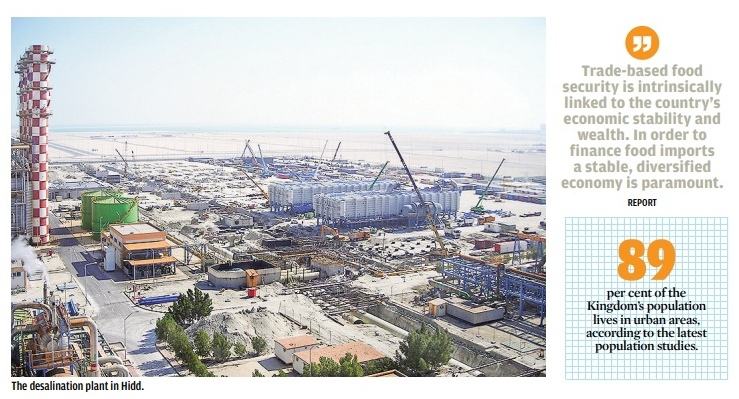30pc of Bahrain populace could face water shortage in six years
Up to 30 per cent of the Kingdom’s population could face water shortage by 2025 if continued action is not taken to prevent a water crisis, according to a report. Although Bahrain currently experiences a comfortable level of water security at the moment, more continuous effort is required to ensure to avert water crisis, according to a report titled ‘Bahrain Food and Water Security’ published by Future Directions International, a not-forprofit strategic research institute. Bahrain currently experiences a comfortable level of tradebased food security; however, it is vulnerable to supply disruptions and price risk, the report states.
“Bahrain is one of the most water stressed countries in the world; up to 30 per cent of the population could face water shortages by 2025,” the report pointed out. “Eighty-nine per cent of the population lives in urban areas and it is quite likely that Bahrain will be close to completely getting urbanised by 2025. “Population growth and urbanisation trends have placed considerable pressure on the country’s natural resource base. “Water consumption is much higher than available natural water resources and food demand far exceeds the production capacity of domestic agriculture.
“Projected population and income growth will exacerbate the mismatch between demand and supply and require the country to secure alternative sources of food and water,” the report said. “Bahrain is one of the world’s most water stressed nations and its groundwater abstraction is unsustainable in the mid to longterm. “The country will need to expand non-conventional water sources significantly to meet demand to 2025 and beyond. Food supply is derived from both domestic and external sources; approximately 92 per cent of Bahrain’s food products are imported. “Trade-based food security is intrinsically linked to the country’s economic stability and wealth. In order to finance food imports a stable, diversified economy is paramount. “Limited natural resources will constrain any significant expansion of domestic food production and Bahrain’s dependence on food imports is likely to increase by 2025, exposing the country to a high degree of price and supply risk.”
“Limited, erratic rainfall and high evapotranspiration rates characterise this arid country. The total annual surface run off is approximately four million cubic meters and there are no rivers, perennial streams or lakes. “The three key water sources in Bahrain are groundwater, desalinated water and treated wastewater. The expansion of the latter two will be crucial in reducing groundwater abstraction and meeting long-term water demand,” the report observed.
“The over-abstraction of aquifers has caused deterioration in groundwater quality in some parts of the country. Salinisation, increased water pollution and the drying of freshwater springs in the north are all the consequence of unsustainable groundwater withdrawal. “There is an urgent need to curb abstraction and protect groundwater resources. In order to achieve this Bahrain will need to expand the production of alternative water sources, particularly the reuse of treated wastewater.”
Related Posts

